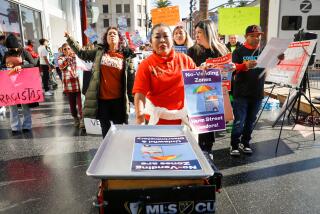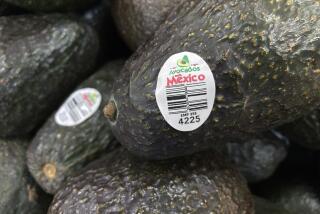Grape Growersâ Claim Rejected
MEXICO CITY â The U.S. International Trade Commission on Monday threw out an anti-dumping case filed by California table grape growers against Mexican and Chilean farmers, ending a tense dispute that many saw as an important test for trade relations in the Western Hemisphere.
Critics had said the California petition was an example of how industries, including steel, lumber, and sugar, try to use U.S. laws to fend off competition by claiming a product is being dumped--sold at below cost or less than prices charged in other countries. The commission voted 5 to 1 to end the dispute, saying it found no indication of material injury or threat.
At issue was the competitive $300-million spring table grapes market, split almost evenly between Coachella Valley farmers southeast of Los Angeles and Mexican growers centered in Sonora state. Small quantities also are grown in Arizona and Chile. The Coachella Valley growers, with about 10% of Californiaâs total grape harvest, had sought to represent all of the state, a move opposed by other California growers who harvest later in the summer and those who distribute Mexican grapes.
In their complaint filed in March, about 20 Coachella farmers said Mexico and Chile were selling table grapes at 35% or more below cost of production, causing wholesale prices to plunge. Such market practices, they charged, enabled Mexico to gain share in a market Californians once dominated.
The Mexicans and Chileans said the low prices last year were an anomaly caused by surplus Chilean grapes usually destined for Europe and by unusually early harvests in Mexico and California. They also opposed the Coachella Valley growersâ effort to speak for the industry.
Dumping complaints are investigated by two U.S. agencies. The Commerce Department determines whether dumping has occurred, and the ITC decides whether there has been injury.
The Commerce Department took up the table grapes case May 10, saying there was âenough to merit an investigation.â But the ITC ruling Monday found there was no material damage. The commission will release more details in July.
âWe are very disappointed,â said Mike Coursey, a Washington attorney who represented the Coachella farmers. âWe will look at an appeal option or going to Congress and getting the law changed.â
The Californians have steadily lost market share in the April-through-June grape harvest season, from about 70% of all sales a decade ago to just 45% now, the same percentage as Mexican farmers, according to government figures.
Mexican farmers concentrated in the area around Hermosillo in Sonora state, about 175 miles south of Nogales, Ariz., said the tripling of their sales since 1990 is due to improved quality and consistency, not unfair pricing.
The Exporters Assn. of Chile, which represents grape growers, said the petition against them was a âscheme to avoid competition.â Chilean grape farmers typically ship to U.S. supermarkets from December through early April, but late harvests, plus a drop in European sales, meant the Chileans had more grapes to sell later in the season, the association said.
In a statement expressing its satisfaction with Mondayâs ruling, the Mexican Economy Ministry said the ITC finding coincided with arguments that it had made in a letter to U.S. Commerce Secretary Don Evans.
The Mexican government had watched the case closely, with some observers predicting that a ruling against its growers would result in retaliation against U.S. imports.
âItâs worth remembering that the petition was put out by 20 growers all located in one place, Riverside County,â the Mexican ministry statement said.
More to Read
Inside the business of entertainment
The Wide Shot brings you news, analysis and insights on everything from streaming wars to production â and what it all means for the future.
You may occasionally receive promotional content from the Los Angeles Times.










